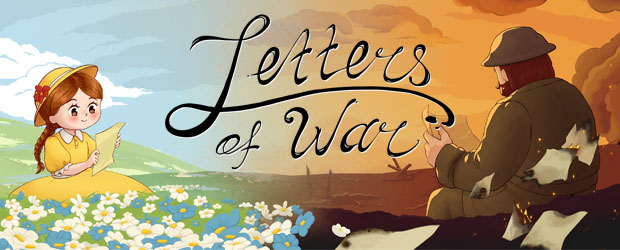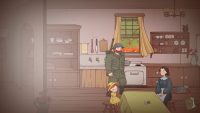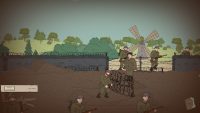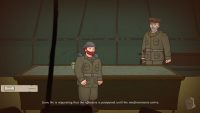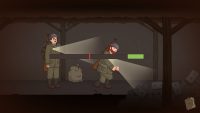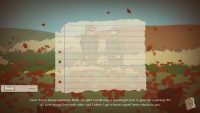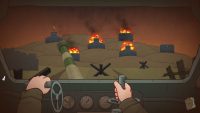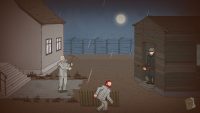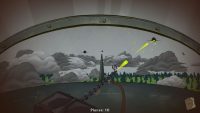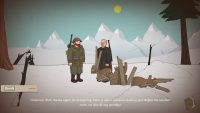Switch to: German
Wood Cabin Games aims to deliver a Valiant Hearts-like experience with Letters of War, but the small indie studio can’t meet this ambitious goal.
Letters of War by Wood Cabin Games from Kazakhstan and Great Britain tells the story of a British family during World War II, which is said to be based on true events. The game is presented largely in 2D and switches between the perspectives of carpenter Liam and his daughter Rosie. While we craft a talisman for her father with Rosie (choosing between a turtle, bear or cat), bake a pudding or treat an injured pigeon, we land with Liam on the coasts of Gela (Sicily) and Normandy during D-Day and take part in the Battle for Monte Cassino. While the young family, including their cat Chamberlain (presumably named after the British Prime Minister), fear for him, veteran Liam looks after the younger recruits at the front. The dialogue is not only full of clichés, it is often generic and suffers occasionally from spelling errors. One scene is emblematic of this: Liam and his fellow comrade walk through a field of blossoming flowers for a long period of time, only to suddenly stop and talk about how much their friendship means to each other in a dialogue so stiff and lacking emotion that it could have been written by an AI bot. Incidentally, you won’t get very far in this game with a controller. The introductory training sequence, which is almost eerily identical to the one in Valiant Hearts: The Great War, can only be completed if you’re skilled at performing finger acrobatics at your keyboard. The unusual key bindings can’t be changed.
Gameplay is pretty varied: In one section clearly inspired by Sam Mendes’ fantastic film 1917, in which we, as a duo behind enemy lines, are tasked with preventing US General George S. Patton from launching a large-scale offensive to avoid falling into a trap, we destroy a couple of houses with a tank merely to take out a sniper. Later, we fend off enemy fighters with an aircraft’s onboard gun and infiltrate the house of the commandant of a French prisoner-of-war camp, searching paintings for a code to open the safe that leads to freedom. Too often, however, we run from one side of the screen to the other across the barren prairie in seemingly endless sequences while dodging artillery shells. And yes, you may already have noticed, the protagonist in this game rapidly transforms from a carpenter who just finished fixing a birdhouse with his daughter to an unstoppable action hero, which doesn’t really fit with the authentic story the game is trying to tell. After fighting in Monte Cassino, Liam finds refuge from a blizzard in a cabin on a mountaintop. Here, we must quickly ignite the fireplace and cook food in a series of quick time events and puzzles, which is a welcome change, initially.
A German soldier enters the cabin soon afterwards He goes by the name Friedemann or at times also Frideman and previously worked as a professor at a Munich university. He says, he doesn’t share the vision of these tyrants and aggressors in power, and that their idea of superiority by racial affiliation disgusts him. After a brief digression into the family history of the man, whose brother was sentenced to death for high treason in not joining the military and his family was put in a concentration camp, Liam thanks him for showing him that not everything is black and white, and the two part ways in a cinematic panoramic shot – the absurd climax of a confusing story, in which perpetrators and liberators are placed on the same level in a shockingly sober manner, the victims play little to no role, and the complex issues of World War II are oftentimes trivialised. Later in the POW camp, the German soldier aids us in escaping and is even referred to as an old friend. Following a plane crash, Liam asks a comrade at the hospital about the camp, which goes unanswered. While the epilogue addresses both civilian and military casualties, it primarily covers the British perspective. The Holocaust is not addressed at all in the Letters of War from what we’ve played. A glitch once automatically reset the ability to access newspaper clippings in the menu, so we can’t say whether there wasn’t an article about it the latter portion of the game. The actual story and the text panels at the end contain nothing about the genocide committed by Nazi Germany, which took the lives of approximately six million Jews and which the BBC reported on as early as 1942.
More care should’ve not only been taken with the game’s content, but also its gameplay. On the one hand, some sections require perfectly timed inputs—especially in the tank versus sniper section, which, due to the numerous checkpoints, is somewhat less frustrating than it initially sounds. On the other hand, the game was riddled with bugs and glitches at the time of testing: For example, a blank piece of paper simply remained at the center of the screen until we rebooted the game, the animation of a pickaxe kept looping while we already had fled the camp and were running through a forest, and sometimes the character vanished completely from the screen. During conversations, the animations seemed to be interrupted whenever we took a screenshot. As the game progresses, we unlock a variety of newspaper articles that chronicle select events from World War II. During our playthrough, our progress upon unlocking these articles was suddenly reset, forcing us to start over with the first one. Our inputs during quick-time events—for example, when we sing with Rosie as part of a children’s choir—are often not registered, but this doesn’t have an impact on the gameplay anyway. The list of technical inconsistencies could go on.
The adventure game features English voice-over and English, Spanish, Chinese, Japanese, and Russian on-screen text. A German translation is planned to be added within a month of the game’s release yesterday. The quality of the voice-over, music, and audio mix leaves much to be desired – we can sometimes barely hear the dialogue because the music is too loud. Likewise, sometimes we’re met with absolute silence—no music and sound effects whatsoever. While the music often is suitable to what’s happening on the screen, the bitrate is sometimes so low that we doubled down on checking if our audio device was in order (the headphones were fine). In a brief section exploring a market, where we once again encounter the same characters we’ve already met numerous times with different beards and hairstyles, the game seems to play real audio recordings in the background, in which we overhear a conversion about champagne—quite inappropriate in this scenario. As with the landings in Sicily and Normandy or in the camp, there are far too few characters on screen to lend the scene any authenticity. While these military operations were highly complex with countless casualties, in the game we throw a handful of grenades in the game to conquer the beach and suddenly we’re greeted with the British anthem. On the loading screens between the five chapters the game offers, we read a mixture of prejudices, trivial facts, and at the very least questionable statements about Great Britain, some of which are so absurd that it’s plausible an AI script could be responsible for that. Visually, Letters of War relies on a similar picture book style like the game’s major inspiration Valiant Hearts. Characters and backgrounds mostly look okay, without even coming close to the high quality of the referenced title. One user asked in the Steam Community Hub whether the developer has used any AI assets to which they responded, all art in the game was hand-drawn by human artists.
Final thoughts
The developers describe Letters of War as a spiritual successor to Valiant Hearts: The Great War. The game already has received a decent sequel titled Valiant Hearts: Coming Home. The Ubisoft series is defined by its relatable characters, and its authentic portrayal of the cruelties of war. Letters of War doesn’t succeed in either over the course of its approximately 3.5 hour play time. The premise of experiencing war through the lenses of a soldier and their family sounds initially interesting. However, the script is so cliché-ridden and inauthentic that we can’t resonate with any of its characters. Towards the end of the game, Catherine tells her young daughter Rosie, there are no good or bad people in war, and there are only those forced to attack or defend themselves, which is highly problematic for several reasons. For moral reasons, the fight against National Socialism in World War II is often referred to as “The Good War” by historians. The game’s dialogue is neither appropriate for the times nor accurate from today’s perspective. This also makes the game look like trivialising aggressors starting wars, and especially in light of Russia’s three-year-long war of aggression against Ukraine, this statement is at least misplaced. Letters of War has a number of such moments that make it clear that the developers weren’t able to do justice to this highly complex subject matter. Added to this are various technical flaws and massive fluctuations in the game’s difficulty. The Steam page for Letters of War is currently unavailable in Germany, but in other countries, such as Austria, Switzerland, the UK, and the US, the game has been available since September 25th for €6.89, £5.89, and $6.99, with a limited-time 10 percent launch discount. If you’re looking for a game truly meeting the quality of Valiant Hearts, we recommend taking the RPG-lite drama Gerda: A Flame in Winter (Steam demo available) into consideration, which takes a much more nuanced look at World War II from the perspective of a courageous civilian in 1945 Denmark.
Letters of War was provided by Wood Cabin Games. We captured the screenshots on PC.

